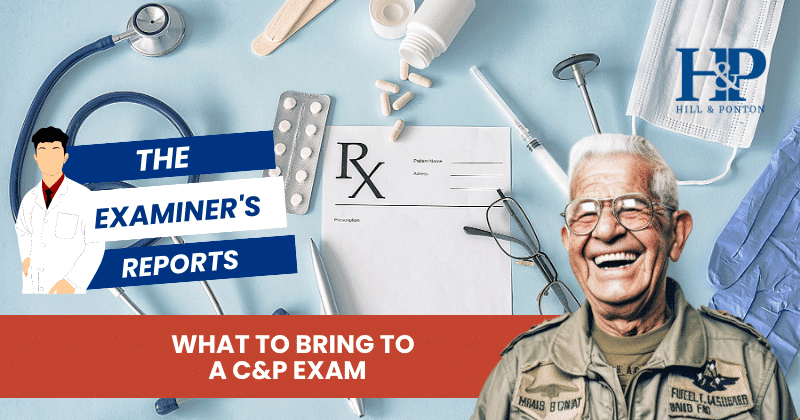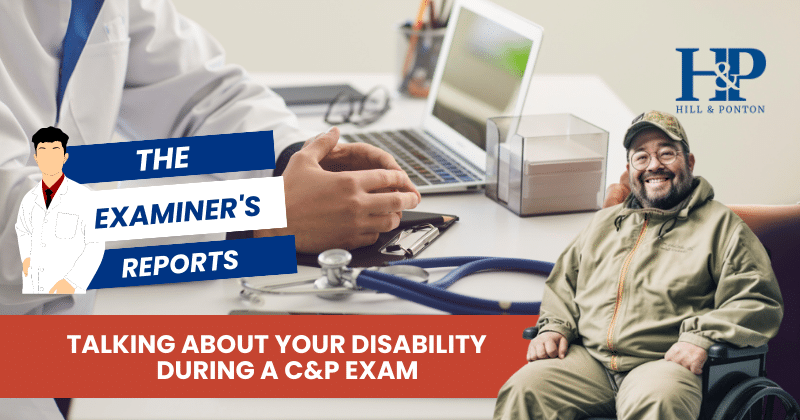
It’s not surprising that most the veterans I see in my practice as a disability examiner suffer from a lack of knowledge – after all, establishing a service connected disability means navigating through an incredibly complex system, and education on the subject is often difficult to weed through.
To combat this knowledge gap and prepare you to successfully defend your claim, one of the most critical elements is learning how to approach your disability compensation and pension exam, which may be successful or not depending on what and how you communicate with your disability examiner during the disability benefits exam itself.
1. Establish your VA disability claim condition before you talk about its relationship to service.
To best understand how to communicate your disability to your assigned provider, it helps to first understand a few general principles about how examiners typically approach Compensation and Pension (aka C&P) exams. It’s a common misconception that the first thing these examiners want to do is determine your claimed condition’s potential causal relationship to military service.
In fact, this relationship may never be investigated if the examiner determines that your condition fails certain criteria (which are set by the VA and can usually be found in your medical records). The truth is that examiners are first attempting to establish whether or not you actually suffer from your claimed illness.
If your encounter fails to prove this, your examiner may fail to diagnose you with your claimed condition, which means evaluating that condition’s service connection is not possible. Here are some common reasons you may be fail to be diagnosed:
- Medical records fail to substantiate that you have ever been diagnosed with your claimed condition.
- Medical records fail to show that you are receiving care for your disability in an ongoing fashion (the VA calls this “chronicity”).
- Sufficient diagnostic evaluation has not been completed by your healthcare provider to substantially rule out organic causes for exclusionary diagnoses like Chronic Fatigue Syndrome and Irritable Bowel Syndrome.
- Your condition fails to meet certain disease-specific criteria. One example is Diabetes Mellitus, for which the VA requires two consecutively high Hgb A1c medical tests reading greater than >6.5%. (See our directory of most common disabilities to see if your condition meets the criteria for a VA diagnosis.)
Veterans I see often simply assume they are diagnosed with a condition without realizing the VA medical center may not see it the same way. Whenever discussing your condition, you should proactively be highlighting the various ways your condition’s medical evidence meets such criteria as what has been mentioned above.
2. Don’t let your examiner rush you.
It’s not uncommon for veterans to regale me with horror stories of times they were assessed for complex conditions in less than 5 minutes with no physical examination.
If you’ve ever looked at a Disability Benefits Questionnaire (which is the exam report a provider is required to submit after your exam), there are a lot of questions on there, and not all of them can be answered by just looking at your medical records.
The best way to communicate the full medical history and symptoms regarding your disability is to brush up on the Disability Benefits Questionnaire most relevant to your condition (see our directory here). This will help you understand what information the VA cares most about for adjudicating VA claims so that you can communicate these specifics to your provider.
Further, if you’re getting the sense that the VA claims medical provider is rushing to complete the doctor’s appointment or not paying full attention, you can simply say, “I’d like to read through some of the points I thought may be important in relation to my disability.”
If you have an orthopedic exam, you can also perform some simple maneuvers to show relevant limitations in your range of motion (which is important in properly establishing a full VA disability claim rating).
Hopefully, when the VA provider hears you mentioning highly specific details, this will clue them in to the fact that you’re educated on the subject and ready to provide all relevant information. But if all else fails, you may consider challenging the VA for administering a bad claim exam (full guide here).
3. Be specific and honest in answering the examiner’s questions.
Many of the veterans I encounter think that exaggerating their symptoms will help them to attain a higher VA rating. However, this is rarely the case considering the fact that a VA rating relies mostly on objective information (like range of motion), rather than a subjective report like pain.
Not only that, but disease syndromes in veterans usually present with an expected constellation of findings, so it’s often easy for the VA provider to tell if you are exaggerating your pain and other symptoms, which can damage your credibility and potentially the success of your claim exam.
You also don’t want to underplay your symptoms, which is another temptation many veterans face. Instead, just be specific. If the examiner asks you about functional limitations that negatively impact you, tell him of particular everyday life activities you have a hard time engaging in due to your disability, especially if they are work-related or impact your life with your spouse.
4. Help your examiner rule out noncontributory causes.
A successful VA claim exam is heavily dependent on the VA doctor determining, as a result of your medical exam, that your disability was “more likely than not” caused by military service.
To do this means being able to confidently say that other potential causes for your disability have been ruled out as contributors (or at least that they are weaker contributors than the relationship you’ve put forth in your claim). The best way to explain this is with some examples:
- If you suffer from sleep apnea, whose number one cause is excess weight gain, you’ll want to show how another service connected condition is what’s responsible for your weight gain as an “intermediate step.” Alternatively, if it is clinically accurate, you may show that the root cause for your sleep apnea is in your upper airway due to sinus issues.
- For migraines, you want to explain that you don’t have any of the classic risk factors like family history, heavy smoking or drinking, or the effects of advancing age.
- GERD diagnoses should rule out contributors like the use of certain medications, smoking history, hiatal hernia, or poor diet.
One relationship I see fail frequently is claiming that an injury in one service-connected joint that is causing disability in another – let’s use the example of an old right knee injury causing eventual pain in the other knee due to a compensation in the gait.
Many examiners opine that injury in one joint does not cause injury in another, reasoning that something like arthritis typically does not “spread” from one joint to another, and that some other unknown injury is the more likely contributor.
One good way to approach this is to mention whether you have any instability in the service-connected knee (which tends to be common in knee injuries) that has caused you to traumatically fall (perhaps repeatedly) on the other knee.
Above all, build rapport with your examiner to help win your disability compensation.
The advice above may encourage you to think that you should come into your VA claim exam with guns blazing – for your own sake, don’t make that mistake!
Keep in mind that, at the end of the day, your examiner is ultimately trying to determine the truth regarding your claimed condition.
Instead of telling your examiner, “I think this is what’s going on,” try asking them, “Do you think this is what’s going on?”
Not only does this show intellectual humility, but it will give you insight into how your examiner thinks, which can be valuable for furnishing a productive discussion about your disability.
Sometimes, you may have a condition which is complex, and you may not be sure the best way to communicate it with your examiner.
In this case, it may be worth hiring a veterans disability attorney who can help guide you through the overall process of starting a claim, getting a positive VA claim exam report, and winning your claim.







